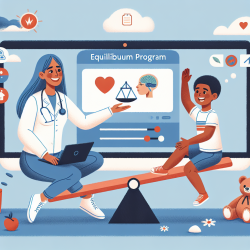Introduction
In the field of speech-language pathology, we are constantly seeking innovative methods to improve outcomes for children. Recent research from Washington State's Fruit and Vegetable Prescription Program provides compelling evidence that nutritional interventions can significantly enhance health outcomes for low-income patients. By integrating similar strategies into speech therapy practices, practitioners can potentially improve both the nutritional status and developmental outcomes of children.
The Power of Nutritional Interventions
The Washington State program distributed $10 vouchers for fruits and vegetables to low-income patients, achieving a 54.4% redemption rate. This initiative not only increased fruit and vegetable consumption but also improved patient satisfaction and engagement with healthcare services. A staggering 88.2% of participants reported eating more fruits and vegetables, demonstrating the program's effectiveness in changing dietary habits.
Implications for Speech Therapy
For speech-language pathologists, incorporating a similar model could enhance therapy outcomes. Here are some potential benefits:
- Improved Cognitive Function: Adequate nutrition is crucial for brain development, which directly impacts language acquisition and cognitive functions.
- Enhanced Engagement: Just as the program improved patient retention in health services, offering nutritional support could increase attendance and engagement in speech therapy sessions.
- Holistic Development: Addressing nutritional needs can support overall health, which is essential for holistic child development.
Implementing Nutritional Strategies
To integrate these findings into speech therapy practice, consider the following strategies:
- Partnerships: Collaborate with local health departments or community organizations to provide nutritional support to families.
- Education: Educate families about the importance of nutrition for speech and language development.
- Screening: Implement screening tools to identify children who may benefit from nutritional interventions.
Encouraging Further Research
While the findings from Washington State are promising, more research is needed to explore the direct impact of nutritional interventions on speech therapy outcomes. Practitioners are encouraged to conduct their own studies or collaborate with researchers to build a robust evidence base.
Conclusion
By leveraging data-driven insights from nutritional programs like Washington State's Fruit and Vegetable Prescription Program, speech-language pathologists can enhance their practice and improve outcomes for children. Integrating nutritional support into therapy not only addresses immediate health needs but also fosters long-term developmental benefits.
To read the original research paper, please follow this link: Washington State’s Fruit and Vegetable Prescription Program: Improving Affordability of Healthy Foods for Low-Income Patients.










